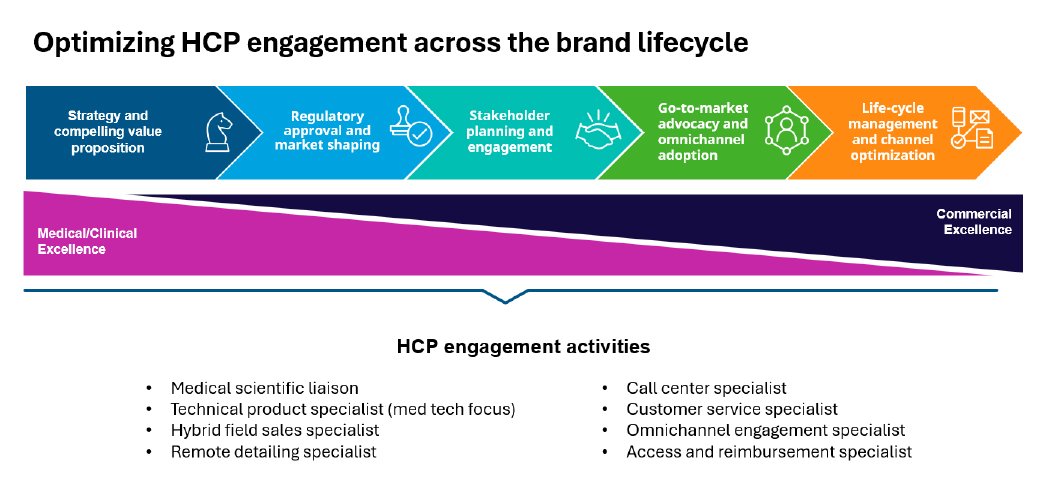Optimising HCP engagement through a data-driven omnichannel strategy

To encourage the uptake of complex therapies in clinical practice, brand teams must ensure they use data-driven insights to understand the needs and preferences of healthcare professionals (HCPs) and then deliver relevant, timely content across a mix of personal and digital touchpoints.
This article discusses the importance of designing and deploying an impactful omnichannel strategy. It also highlights the key role that outsourcing to an experienced third-party provider can play in advancing HCP engagement and how to use change-management strategies to ensure impactful delivery while building trusted future relationships with key customers. A thoughtful approach will improve the odds of success.
Building robust, enduring relationships with healthcare professionals (HCPs) in a cost-efficient manner is an essential aspect of integrating innovative therapies into clinical practice. Life sciences brand teams must challenge themselves to refine their tactics in ways that create a commercialisation strategy that impactfully engages and informs HCPs.
Using advanced data-analytics tactics, brand teams can develop deep insights to make HCP engagement more impactful across the entire lifecycle of the therapy (Figure 1). Specifically, by understanding the types of information HCPs seek and the channels and formats they prefer, brand teams can develop personalised content that resonates best with them. The traditional approach in the past has historically relied primarily on high-volume promotional, product-focused messaging. However, adopting a more HCP-centric omnichannel strategy can help them better understand how the therapy best fits as a viable and affordable treatment option within a specific therapeutic space and for a specific, defined group of patients.

Figure 1.
Identifying effective ways to engage with HCPs and then delivering on this promise can be a tall order for any brand team. Adding to the complexity is the need to integrate the approach across multiple brand teams within the organisation to ensure consistent branding.
Different challenges arise for companies throughout the brand lifecycle of any given therapy, and the challenges associated with this approach will vary depending on the size and capabilities of the organisation. For instance, small or emerging companies may have resource constraints or limited bandwidth, whereas larger, more established companies may not have the agility to move quickly or be able to rapidly or cost-effectively accelerate initiatives, up or down, in response to an opportunity.
Creating an outsourcing arrangement with an experienced third-party partner can help to accelerate the capabilities of a brand team when it comes to creating an efficient, effective HCP omnichannel strategy. Such partnerships can also help manage cost and reduce risk for the company.
Helping HCPs close knowledge gaps and build trust with the brand
Historically, the pharmaceutical promotional sales representative has been at the centre of the commercialisation strategy, especially for high-value specialty therapies that are approved to treat one or more complex disease states. While visits from sales reps continue to play a significant role in the commercialisation strategy for any therapy, many HCPs also engage other channels when seeking information about, and support from, the brand.
To capitalise on this paradigm shift and support HCPs more effectively, brand teams are increasingly taking full advantage of the many personal and digital channels that are available today.1
- Personal channels include in-person or remote engagement, attending professional conferences and events, and virtual access to specialists (such as medical/scientific specialists, call centre capabilities including customer service personnel, and more). Optimising newer channels such as online chat forums are another way to increase the HCP’s familiarity with the brand and help overcome clinical or commercial barriers, so they feel more confident and informed when prescribing.
- Digital or online channels include personalised emails from reps, email campaigns from the brand team, webinars, social media, chatbots and virtual assistants, text messaging, product- or disease-focused websites or apps, and online self-guided learning platforms.
The ability to use state-of-the-art data analytics and modelling to better understand the motivations, behaviours, and preferences of individual HCPs enables a brand team to tailor messaging in ways that will resonate more strongly with prescribers. Brand teams can use artificial intelligence (AI), machine learning (ML), natural language processing (NLP), integrated insights, and other methodologies to analyse historical customer-engagement data and research behaviours. This can help create personalised, data-driven next-best actions that improve the overall experience for the HCP and increase trust in, and loyalty toward, the company and the brand.
Consider outsourcing to optimise asset and resource allocation
Creating a harmonised HCP omnichannel strategy can be a time-consuming and resource-intensive undertaking. Getting it right can be rewarding for both the brand team and the HCP. Life sciences companies must invest in state-of-the-art data-analytics capabilities to generate robust insights from multiple available data sources, build out the required technology infrastructure, and ensure they hire and train the right mix of people to deliver the many high-touch elements of the omnichannel strategy.
Aligning the effort across multiple parallel channels, coupled with capturing and analysing the sheer volume of data associated with each channel, can often be overwhelming for brand teams. With pressure to streamline operations and manage increasing costs and risk, many life sciences companies are now choosing to partner with a third-party expert, rather than develop the required infrastructure, technology, and staffing in-house.
Third-party partners can provide standalone components of the omnichannel strategy or the entire integrated HCP engagement solution and can offer the following benefits:1
- Access to expert knowledge, additional technical and operational capabilities, and flexible staffing: Outsourcing partners have deep domain expertise, as well as access to the latest technologies and best practices. This helps minimise the learning curve and provides opportunities for economies of scale during implementation.
- Significantly reduced costs: The cost of software acquisition, infrastructure development, and flexible staffing are high. Outsourcing provides an opportunity to convert fixed costs into variable costs, enabling brand teams to pay for only the most timely, impactful, and relevant services.
- Faster implementation: An experienced third-party partner can expedite the entire process and get the overall offering up and running faster. This is extremely useful for teams wishing to test a market strategy or target a new opportunity with their brand by using new data, obtaining regulatory approval, or capitalising on other market opportunities.
- Enhanced scalability and agility: The needs of any complex therapy will continue to evolve throughout its lifecycle. The ability to cost-effectively scale the omnichannel strategy is useful to accommodate changing objectives related to the brand. Being able to respond quickly to changing customer demands and competitive market conditions can help the strategy to remain relevant while reducing the risk associated with owning the entire process internally.
- Improved system reliability and security: Omnichannel programmes handle sensitive data, making them a potential target for cybersecurity threats. Experienced outsourcing partners can offer robust technology infrastructure and security measures to protect data and ensure peace of mind.
Outsourcing arrangements have the flexibility to make it easier for the brand team to run pilot programmes to test a hypothesis, a message, or a specific go-to-market approach before fully committing to a new strategy. This provides them with both the complete flexibility to maximise opportunities quickly and the opportunity to scale up the offering or pivot to a new and revised approach in response to the outcomes from the pilot programme.2
Best practice: Embrace change-management principles as part of any omnichannel strategy
Implementing a complex omnichannel strategy will require new business processes, skill sets, and an expanded technology infrastructure. It will also require an unprecedented level of coordination and integration at an organisational level, among different teams. Ensuring the integration of outsourced individuals to firmly embed them within the organisation will help to address complexity and enhance overall operational efficiencies.
Such transformation is not about simply adopting new technologies or systems. Rather, it requires adopting a new corporate culture and mindset.
To manage this complexity and maximise the chance for success, brand teams should embrace proven change-management principles. This involves implementing a thoughtful, strategic programme with sufficient resources to develop employee competencies and ensure optimal systems integration. When people feel involved and have the right skills, knowledge, and mindset, they feel empowered to shape decisions and are committed to carrying out their objectives through a shared vision and common goal. Getting top-down commitment from senior leadership is critical.2
A successful, data-driven omnichannel strategy will help close knowledge gaps among HCPs, build trust with the brand, and differentiate it with a strategic advantage for the therapy. Over time, this helps address two key objectives: improving both clinical outcomes and the quality of life for patients, and driving revenue and enhancing the brand’s reputation, thus building a stronger customer experience. Such differentiation is especially important for brands competing for market share in a crowded therapeutic space.
Reference
- Bate, M. Strengthen your brand with commercial outsourcing. IQVIA Blog. https://www.iqvia.com/blogs/2024/04/strengthen-your-brand-with-commercial-outsourcing. April 23, 2024.
- Evans C, Woods T, Wooden C, Bayley H. Time to take omnichannel action: Delivering an optimal customer experience through the harmony of people-based and digital channels. IQVIA white paper. time-to-take-omnichannel-action.pdf (iqvia.com).












